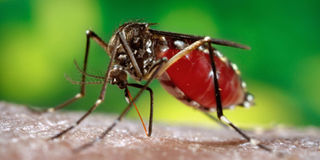Ministry dismisses Zika reports

What you need to know:
- It was reported that a National Institute for Medical Research (NIMR) study had established that 87 out of 533 screened people were suffering from Zika fever.
- The public panicked, with social and mainstream media awash with comments.
Dar es Salaam. The government has denied reports about 87 Zika patients in eight regions.
It was reported that a National Institute for Medical Research (NIMR) study had established that 87 out of 533 screened people were suffering from Zika fever.
The public panicked, with social and mainstream media awash with comments.
The minister for Health, Community Development, Gender, the Elderly and Children, Ms Ummy Mwalimu, insisted in an emergency news conference here that: “Tanzania has no Zika patient. NIMR on Thursday just reported findings of a [pilot] study on efficiency of a new research device for Zika and Chikungunya viruses.’’
Early this year, Ms Mwalimu had called on the public not to panic about Zika.
Ms Mwalimu was accompanied by chief medical officer Muhammad Kambi, NIMR director general Mwele Malecela and deputy Healthminister Hamisi Kigwangalla in the news conference.
Dr Malecela earlier issued the report that caused anxiety, yesterday accused the media of reporting the matter “inaccurately”.
“The findings only showed that there were strains of Zika virus in samples drawn from people in eight regions. There is no Zika patient,” she said.
She noted that the report she presented to the media highlighted the country’s public health situation for the past one year, including preliminary findings of a pilot study that found strains of Zika virus in samples drawn from at least 87 people out of 533 in Mwanza, Simiyu, Shinyanga, Geita, Kigoma, Tabora, Singida and Morogoro regions.
“Our preliminary research focused on the capacity of the device used to identify Zika and Chikungunya viruses. We will conduct further studies to get more findings on the virus and other communicable diseases.
Zika virus is primarily spread by the female Aedes aegypti mosquito, which is active mostly in the daytime. This mosquito exists in Tanzania, making the country endemic to the virus, according to the Centres for Disease Control.
The virus was first isolated in April 1947 from a rhesus macaque monkey that had been placed in a cage in the Zika Forest in Uganda, near Lake Victoria, by Yellow Fever Research Institute scientists, studies indicate.
Zika virus can be passed on from a pregnant woman to her foetus. Infection during pregnancy can cause certain birth defects, where a child is born with a small head—microcephaly. Neither vaccine nor cure exists for Zika fever or its complications.
Dr Kigwangalla directed NIMR to follow proper channels whenever making sensitive findings to public.
He alluded to the International Health Regulations of 2005, which require that there should be a special unit within the Ministry of Health which has the mandate to announce outbreaks of life-threatening diseases. The information must be communicated to the chief medical officer and the World Health Organisation.
However, The Citizen understands that NIMR did not announce an outbreak on Thursday.
“The government has the mandate of announcing the occurrence of any infectious disease. We are aware of the efforts made by the research institutions that focus on complimenting the government commitment to end communicable diseases,” he noted.
“We are dedicated to ensuring that people are not exposed to communicable diseases such as malaria, Ebola and Zika. We have already put in place strategic plans to curb communicable diseases.”
He urged people to use insecticide-treated nets and keep their residential areas clean to protect themselves against mosquitoes that spread malaria parasites.
Prof Kambi said the Ministry would continue working closely with research institutions so as to scale up the findings and come up with best solutions to combat infectious diseases.
“We need more findings on the report that has just been released by NIMR for experts to review according to scientific procedures.’’



